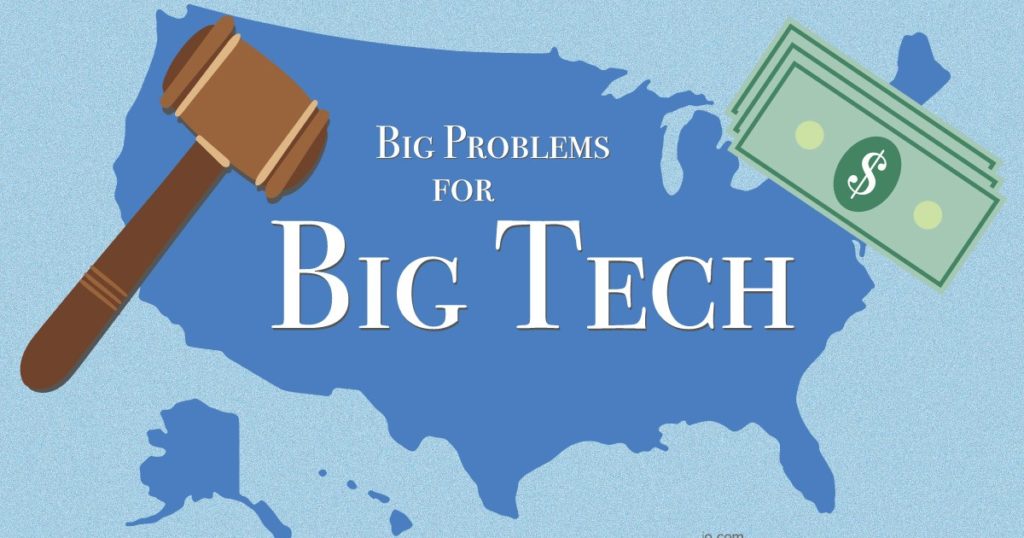The announcement last Wednesday of new lawsuits for Google, Facebook, and Twitter indicate growing problems for Big Tech. From antitrust actions to free speech violations, Silicon Valley is under fire. And while legislation in the House of Representatives may be further cause for concern for Big Tech, there is speculation as to what steps, if any, the government will succeed with in reigning in the power of these dominant forces.
Here, Bienert Katzman Littrell Williams LLP analyzes current actions and proposed legislation and what they mean for the future of our clients’ interest and for Big Tech as a whole.
Former President Trump Heads Class-Action Suit against Facebook, Twitter, and Google
Former President Donald Trump filed suit Wednesday against Google, Facebook, and Twitter alleging free speech violations. Mr. Trump remains banned from posting on Facebook and Twitter stemming from comments he made leading up to the January 6, 2021, insurrection at the Capitol. Mr. Trump contends that Big Tech “has been illegally deputized as the censorship arm of the U.S. Government,” according to his opinion piece in The Wall Street Journal.
Mr. Trump claims Big Tech is using protections given by Section 230 of the 1996 Communications Decency Act to control a political narrative. Section 230 states that interactive platforms like social media sites cannot be treated as publishers of third-party content (except in certain criminal or intellectual property-based claims), but it allows for moderations of obscene content or that which violated platform policies made in “good faith”. Mr. Trump asserts that “the internet is the new public square,” and his exclusion from participating in the important speech avenue violates his First Amendment Rights.
Google Sued for Antitrust Violations
Thirty-six states and the District of Columbia on Wednesday filed an antitrust suit surrounding the Google Play Store mobile app marketplace. The suit alleges antitrust violations since Google holds 90 percent of the market share for Android apps. Google faces similar 2020 complaints from the Department of Justice and other states relating to the company’s dominance in the mobile search market and the power of its advertising technology.
The announcement follows the dismissal last week of an antitrust suit against Facebook criticizing its 2012 acquisition of Instagram and 2014 acquisition of WhatsApp. The suit accused Facebook of neutralizing competition from the two popular social media platforms and effectively devastating competition in the marketplace. The court ruled in its dismissal that the plaintiff states waited too long to challenge the purchases, and that that FTC had failed to clearly and convincingly provide evidence of Facebook’s dominance.
While the Google Play Store has been targeted in the most recent suit, Apple’s App Store has not. Both companies charge developers percentages on app purchases, and both announced a decrease in said percentages in March 2021.
Government Intervention
The House of Representatives Antitrust Subcommittee voted last month to advance a handful of bills seeking to regulate the power of Big Tech companies like Amazon, Apple, Facebook, and Google. The bills generally look to promote competition in the digital marketplace. None address censorship or lack thereof, and none mention privacy protection.
While the House Judiciary Committee has laid a framework, a vote on the bills is still far off. One bipartisan debate is whether the Department of Justice should have sole authority to investigate and enforce violations or whether it should share authority with the Federal Trade Commission, as it does now.
American Choice and Innovation Online Act
- Bans dominant platforms from giving their own products advantage over competitors.
- Prohibits discriminatory acts like self-preferencing and blocking access of competitors to platform.
- Protects non-public data collected by competitors through the platform so it may not be used to influence product development or marketing decisions. For example, Amazon would not be able to collect private sales data from third parties to influence its own strategy.
Platform Competition and Opportunity Act
- Prohibits acquisition of competitive threats that entrenches a dominant platform’s power in the marketplace, i.e., Facebook’s acquisition of Instagram and WhatsApp.
- Shifts the burden of proof to platforms to show mergers and acquisitions are lawful. Currently, the FTC has the burden of proof to show violations.
Ending Platform Monopolies Act
- Prohibits dominant platforms from using control over multiple business to disadvantage competitors, including incentivizing a business to favor its own services over competitors. For example, Apple undermining third-party app developers for the interest of its own apps.
Augmenting Compatibility and Competition by Enabling Service Switching (ACCESS) Act
- Allows users, including businesses and consumers, to securely transfer data from one platform to another through interoperability and data portability.
Merger Filing Fee Modernization Act
- Updates filing fees for mergers. Raises funds for the FTC and DOJ to aggressively investigate violations and enforce antitrust laws.


